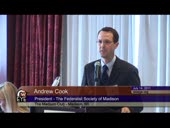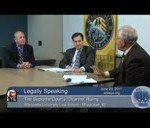Separation of Powers and the Wisconsin Supreme Court
 Yesterday, I participated in a panel discussion hosted by the Madison Chapter of the Federalist Society, entitled “Separation of Powers: Wisconsin Supreme Court’s Decision Upholding the Collective Bargaining Law.” The discussion was moderated by Justice Jon Wilcox of the Wisconsin Supreme Court (Retired) and along with myself the panel included Deputy Attorney General Kevin St. John, who argued the Ozanne v. Fitzgerald case on behalf of the State of Wisconsin. The entire discussion was recorded by Wisconsin Eye and can be viewed at this link.
Yesterday, I participated in a panel discussion hosted by the Madison Chapter of the Federalist Society, entitled “Separation of Powers: Wisconsin Supreme Court’s Decision Upholding the Collective Bargaining Law.” The discussion was moderated by Justice Jon Wilcox of the Wisconsin Supreme Court (Retired) and along with myself the panel included Deputy Attorney General Kevin St. John, who argued the Ozanne v. Fitzgerald case on behalf of the State of Wisconsin. The entire discussion was recorded by Wisconsin Eye and can be viewed at this link.
What follows are my prepared remarks. However, I encourage interested readers to follow the above link in order to hear both Attorney St. John’s able defense of the Ozanne decision on separation of powers grounds, and also the questions and answers following our presentations. I want to thank Andrew Cook and the Federalist Society for the opportunity to present my views.

